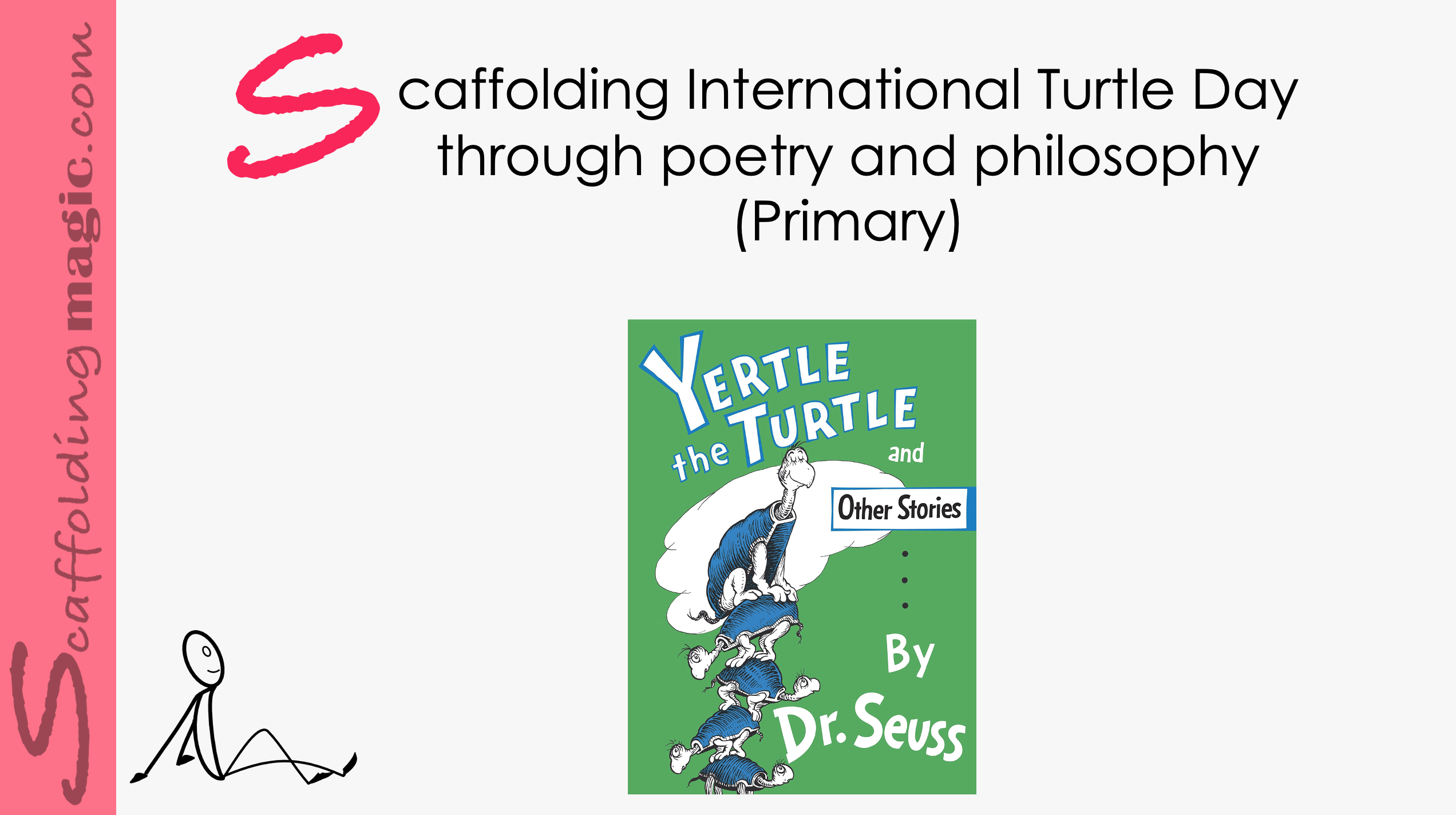- a children’s book writer…
- a poet…
$5.00
Seriously? A children’s book about turtles is philosophical? Oh yes it is! Theodor Seuss Geisel (Dr. Seuss), was not just a writer of children’s books, but a profound philosopher, a poet, a political advocate (sometimes controversial), and a promoter of critical thinking on all levels.
Adding humour to a lesson is always a recipe for success. Humour changes the dynamic of the class and helps students to see their lessons with a different frame of mind. This scaffold uses irony – the highest form of humour – to help make potentially dry material more inviting and accessible.
The use of humour is engrained in our cultural perspectives. Edward T. Hall, one of the pioneers of cultural studies for the purpose of preparing us for and appreciating the differences in peoples across the globe, elucidates the varying uses of humour in different environments. American humour, for instance, is binary and is either present or absent. In the Far East, on the other hand, one encounters a wide spectrum of subtle degrees of humour that are commonly present.*
Adding humour to a lesson is always a recipe for success. Humour changes the dynamic of the class and helps students to see their lessons with a different frame of mind. This scaffold uses irony – the highest form of humour – to help make potentially dry material more inviting and accessible.
The use of humour is engrained in our cultural perspectives. Edward T. Hall, one of the pioneers of cultural studies for the purpose of preparing us for and appreciating the differences in peoples across the globe, elucidates the varying uses of humour in different environments. American humour, for instance, is binary and is either present or absent. In the Far East, on the other hand, one encounters a wide spectrum of subtle degrees of humour that are commonly present.*
Using information wheels in lessons is a wonderful way of giving our students the opportunity to learn through, among other learning styles, kinesthetic interaction. They’ll be pulling from past knowledge, using deductive reasoning, negotiating meaning, and learning new subject matter, all at the same time. Studies show that learning is enhanced when students acquire knowledge through active processes that engage them. Literacy is a combination of recognising and matching oral and written language. The most effective ways of promoting literacy is to make vocabulary visible and to create high encounters with these words for your students – in interactive ways. Using wheels to scaffold vocabulary before you read a story can help. Below you’ll see how you can help your students to match words with images with an information wheel. information wheel.
Using information wheels in lessons is a wonderful way of giving our students the opportunity to learn through, among other learning styles, kinesthetic interaction. They’ll be pulling from past knowledge, using deductive reasoning, negotiating meaning, and learning new subject matter, all at the same time. Studies showthat learning is enhanced when students acquire knowledge through active processes that engage them. Literacy is a combination of recognising and matching oral and written language. The most effective ways of promoting literacy is to make vocabulary visible and to create high encounters with these words for your students – in interactive ways. Using wheels to scaffold vocabulary before you read a story can help. Below you’ll see how you can help your students to match words with images with an information wheel. information wheel.
The International Thank You Day – celebrated by many on January 11th, others on June 11th – is a wonderful opportunity to help our students to focus on gratitude and add to positive forces in the world. Including gratitude in the educational environments is proven to improve relationships both in and outside of the classroom. Stressing affective factors in our lessons aligns us Vygotsky’s assertion (1978) that our students are more likely to step outside their comfort zone (ZPD) when they feel that they are supported and nurtured.
The International Thank You Day – celebrated by many on January 11th, others on June 11th – is a wonderful opportunity to help our students to focus on gratitude and add to positive forces in the world. Including gratitude in the educational environments is proven to improve relationships both in and outside of the classroom. Stressing affective factors in our lessons aligns us Vygotsky’s assertion (1978) that our students are more likely to step outside their comfort zone (ZPD) when they feel that they are supported and nurtured.
Cultural differences extend far beyond language, greetings, gestures, dress and beliefs. The very space we create when we meet people – or the absence of that space – is indicative of where we come from and what our understanding is of the (dis)comfort level of those we are with.
This scaffold helps us see how we can honour physical space, amongst many other differences between cultures. It includes the affective side of learning – in developing more understanding and compassionate citizens of the world as our students travel across the planet physically and/or virtually.
